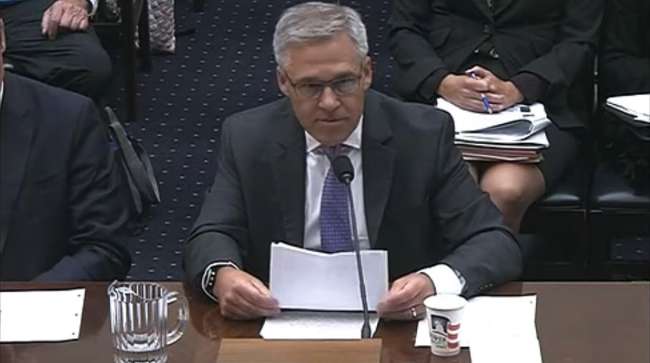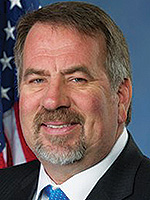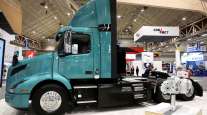Senior Reporter
Cummins Executive to US House Panel: Investments in Low-Emissions Technologies Critical

[Stay on top of transportation news: Get TTNews in your inbox.]
WASHINGTON — Federal policymakers crafting comprehensive transportation legislation should consider enhancing investments in low-emissions technologies across the freight sector, an executive with Cummins Inc. told a congressional panel July 16.
Tony Satterthwaite, vice president at Cummins, explained the investments in battery-electric vehicle technology, as well as hydrogen and natural gas fueling infrastructure, are critical.
“It is important for suppliers to continually produce more sustainable, low- or no-carbon fuels, vehicle technologies and infrastructure that measurably improve well-to-wheels climate impacts and address other relevant sustainability impacts and benefits,” he said in prepared remarks at a hearing of the House Select Committee on the Climate Crisis.
Climate change is a significant threat, worthy of a diversity of approaches. See what @Cummins Distribution President Tony Satterthwaite told a House Select Committee investigating what can be done in the heavy-duty transportation sector. https://t.co/nqltovq3j3 #EnergyDiversity — Cummins Inc. (@Cummins) July 16, 2019
He also expressed support for repealing the 12% federal excise tax on heavy-duty trucks and reauthorizing the Diesel Emissions Reduction Act (DERA). On funding, Satterthwaite said Congress should consider a vehicle-miles-traveled (VMT) fee designed to bolster revenue for a soon-to-be-insolvent federal highway account. That account, the Highway Trust Fund, relies on dwindling revenue from the Clinton-era fuel tax.
“Enacting policies that promote the power of choice for every market will help ensure that this country and every community within it has the proven technology necessary to meet air quality and climate goals and serve the economy,” Satterthwaite added.

Castor
Committee Chairwoman Kathy Castor (D-Fla.) explained that encouraging less-polluting vehicles throughout the commercial transportation sector would promote public health. As she put it, “Moving heavy-duty transportation to cleaner technologies can help address these ongoing inequities, improve people’s health and tackle the climate crisis.”
Earlier this year, House lawmakers unveiled legislation that would reauthorize the DERA program at the U.S. Environmental Protection Agency through 2024. The bill’s aim is to help facilitate the rebuilding or retrofitting of diesel engines to comply with pollution standards.
The Republican-led Senate Environment and Public Works panel advanced its version in April. The committee’s top Democrat, Delaware Sen. Tom Carper, the bill’s sponsor, called on colleagues to pursue policies designed to ensure new infrastructure projects are capable of withstanding the force of severe weather events. The bill, however, awaits floor action.
Speaking to reporters July 16, Carper suggested, “We confront the climate crisis head-on, reduce carbon emissions, enhance climate resiliency and support millions of new clean-energy jobs to go on top of the 3 million that are already in existence today.”
DERA grants are distributed by EPA. The agency announced it anticipates awarding about $40 million in grants for the clean-diesel funding assistance program. Older diesel engines emit higher amounts of pollution, according to the agency. It explained, “Exposure to diesel exhaust can lead to serious health conditions like asthma and respiratory illnesses and can worsen existing heart and lung disease, especially in children and the elderly.”
In the spring, a group of House and Senate lawmakers introduced legislation that would repeal the 12% federal excise tax on certain heavy-duty trucks, tractors and trailers. The legislation’s sponsors argue the excise tax could add, on average, $12,000 to $22,000 to the sale of a new truck.

LaMalfa
“The FET made sense when it was implemented 100 years ago, but just like trucks that were designed in 1917, it’s no longer the best option in the modern world,” said Rep. Doug LaMalfa (R-Calif.), a member of the transportation committee. “Today, it’s a cost-prohibitive barrier for small businesses looking to upgrade their outdated trucks to safer, cleaner, more modern vehicles. The average age of most heavy-duty trucks on the road today is nearly 10 years old — that means a decade worth of technological advancements is effectively being sidelined.”
Republican leaders on Capitol Hill have not called for legislating on climate-centric policy and continue to call for streamlining the environmental permitting process. The Environment and Public Works Committee is expected to consider a wide-ranging highway bill Aug. 1. Its House counterpart has yet to schedule consideration of such legislation.




